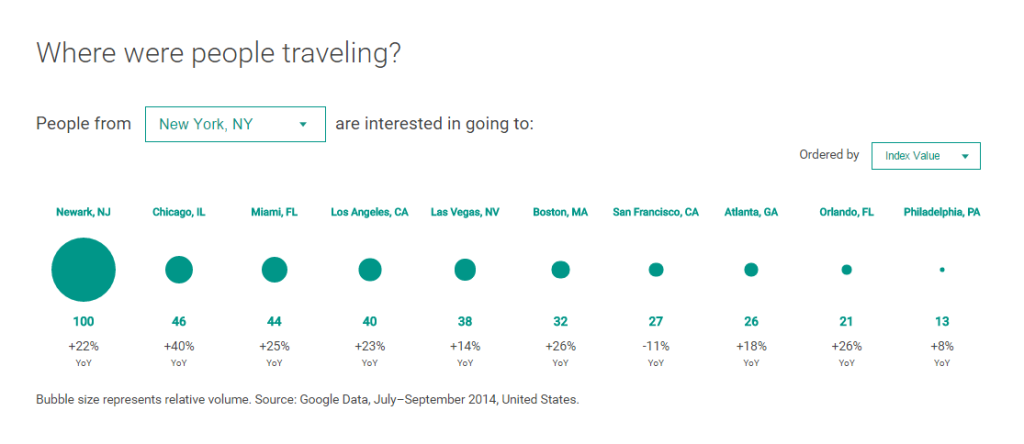
Think with Google, the organization’s marketing research arm, recently launched its Travel Dashboard. This free online tool highlights recent and year-over-year trends across the car rental, air, and hotel verticals in the United States using Google data.
Google is the data king, and this is a nice resource they’re sharing with the travel and tourism industry, but it is one that should come with a warning: data is just data. It’s the proper evaluation of this data that makes it valuable information.
Take for instance the Travel Dashboard’s analysis below of where people from New York are traveling to. I can assure you that no one in New York is “interested” in going to Newark, NJ. Obviously Newark’s airport is skewing the data, being a major travel hub for New Yorkers – but you can see how it can become misleading when taken at face value.

This chart from Think with Google shows that accurately interpreting travel data can reveal more than the numbers alone.
A more glaring issue is Google’s 2014 Infographic on Staycations, which hypothesized that last summer’s most popular destination was your own backyard. The truth is that U.S. air travel saw major growth in 2014, with 71.8 million passengers in July alone (up 3.8% from July 2013).
One major issue is that much of the infographic’s claim is based on the fact that searches for the word “staycation” were up 10% YoY. That would be like assuming sandwich sales are up this month because more people are searching for Subway.
The infographic also looked at the hotel searches coming from six major markets (New York, Washington D.C., Atlanta, Los Angeles, San Francisco, and Chicago). Leading up to the summer months, most of these areas had their own city in the top hotel searches. For instance, hotels in New York, NY were the most searched hotels by those within New York.
This data is a little more interesting, but it certainly doesn’t solidify the “summer of staycations.” If the claim was true and more people were planning to travel close to home in 2014, then why would they need a hotel in their hometown? That defeats the purpose of a money-saving staycation.
One possible answer for this trend is the fact that hotels are a source of dining, nightlife, and entertainment in major markets like LA, NY, and Chicago. A New Yorker would certainly visit a New York hotel website in making plans for a Friday night, but that doesn’t guarantee occupancy.
As I mentioned earlier, it is great that Google is sharing this information with marketers, and there is much that can be learned – but like everything in marketing – take it with a grain of salt. Data is nothing without proper analysis.